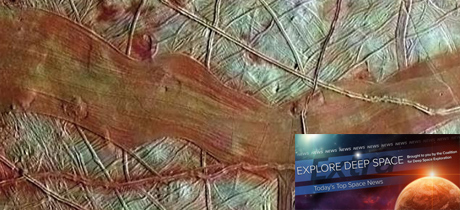In Today’s Deep Space Extra… Policy makers wrestle with how to maintain the nation’s drive to explore space and its economic potential in the face of the costly coronavirus pandemic. The National Academies urges NASA to establish a permanent, independent planetary protection advisory panel.
Human Space Exploration
Cygnus departs Space Station, beginning extended experimental mission
Coalition Member in the News – Northrop Grumman
Spaceflightnow.com (5/11): Northrop Grumman’s 13th resupply mission to the International Space Station (ISS) departed after nearly three months on Monday. The freighter’s mission is not over however. It will continue to orbit solo, serving Wednesday as the platform for a couple of small satellite launches using a SEOPS, LLC, Slingshot deployer, then as an experiment platform for a multi-phase NASA investigation into fire ignition, spread and suppression aboard a roomy spacecraft, all to help prepare for future human deep space exploration. Deorbit is planned for May 29.
Space Science
Independent process needed for setting Planetary Protection Policy
Spacepolicyonline.com (5/11): Growing international and commercial interest in exploring neighboring and distant planetary bodies with human as well as robotic missions has prompted the National Academies of Science, Medicine and Engineering to call for NASA to create a permanent independent advisory group focused on planetary protection. Planetary protection is the science of restricting terrestrial microbes from contaminating planetary bodies such as Mars and the reverse in regards to preventing sample materials from other planetary bodies from contaminating the Earth.
Salty water might exist on Mars, but it’s probably too cold for life
Science News (5/11): An effort by scientists to model the Martian environment, suggests there are regions on the surface and seasonal periods of the climate that could support the presence salt laden liquid water, or brines. However, the temperatures would be far too cold to support microorganisms from Earth as currently known. The finding may help to ease planetary protection concerns that human exploration might contaminate the Red Planet.
Newly reprocessed images of Europa make this world even more interesting and mysterious
Universe Today (5/11): A new look at imagery of Jupiter’s ice and ocean covered moon Europa captured by NASA’s Galileo mission between 1995 and 2003 is providing some startling views. Scientists are hopeful the imagery will spur new interest in NASA’s Europa Clipper mission, a spacecraft that would orbit Jupiter, making a series of close flybys of Europa and perhaps close enough to fly through geyser like eruptions to sample whether they contain evidence of biological activity.
NASA wants to chase interstellar objects with “orbital slingshot”
Futurism (5/11): A couple of mysterious planetary objects, Oumuamua spotted in 2017 and 2I Borisov in 2019, have sparked new interest because their origins have declared from outside our solar system. Researchers from MIT are suggesting a strategy that uses solar sails and the gravitational forces of the sun as a means of propelling spacecraft themselves toward future extra solar objects for close up scrutiny.
Op Eds
Toward a brighter future: Continuity of the Artemis program
Coalition Members in the News – Dynetics, Northrop Grumman
The Space Review (5/11) NASA’s Artemis initiative continues to hit key milestones and move programs forward, writes Jamil Castillo, the Coalition for Deep Space Exploration’s space policy and digital communications manager. NASA’s strategy to incorporate U.S. commercial as well as international partnerships are an essential part of the nation’s efforts to overcome the COVID-19 pandemic, advance technology and spur economic opportunity. “Achieving a mission to land humans at the lunar south pole, while enhancing that effort with aspirations for a human mission to Mars, will be a critical source of unity and inspiration for Americans, and for humanity.” writes Castillo.
Other News
Coronavirus: Branson to sell Galactic stake to prop up Virgin
BBC (5/11): Richard Branson and Virgin Galactic look to sell more than $500 million in publicly traded shares in the space tourist company to help the Virgin Group and its airline assets recover from losses attributed to the coronavirus pandemic.
First two smallsats launched for Chinese data relay constellation
Spaceflightnow.com (5/12): China succeeded Tuesday in the launching of the first two spacecraft for a planned 80 satellite Xingyun communications and data relay satellite constellation. The network will be evaluated by users within the marine shipping, forestry and construction machinery industries. The launch also marked a bit of revival for China’s commercial launch sector impacted by the COVID-19 pandemic.

